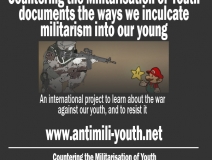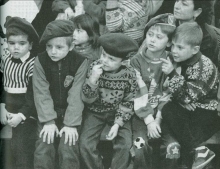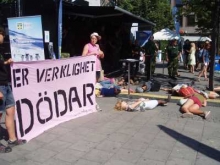Countering the Militarisation of Youth Programme (CMoY) at WRI is launching the first issue of its new periodical which will specifically focus on the issues surrounding youth militarisation. In the CMoY bulletin, you'll find articles addressing...
Countering the Militarisation of Youth is a project of War Resisters' International | 2017 | All content of this site is licenced under a Creative Commons Attribution-NonCommercial-ShareAlike 2.0 UK: England & Wales License, unless otherwise stated.
Website development by Netuxo Ltd










